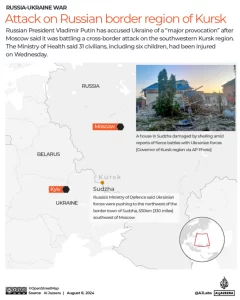Aug- 8- The Kursk region of Russia has witnessed its third consecutive day of fierce fighting, according to Moscow’s defense ministry. The confrontation began when Russian officials reported that a contingent of at least 1,000 Ukrainian troops, equipped with tanks and armored vehicles, crossed the border into the region on Tuesday. The conflict has led to significant casualties and disruptions, with local authorities confirming the deaths of at least four individuals and the evacuation of approximately 3,000 residents.
Official Reactions and Claims
Russian President Vladimir Putin has characterized the Ukrainian incursion as a “major provocation” and accused Ukrainian forces of indiscriminately targeting civilian infrastructure. In response, Russia’s Defense Ministry reported that Ukrainian attempts to advance into the Sudzha and Korenevo districts were successfully repelled through coordinated efforts involving both the military and the Federal Security Service (FSB). Despite these claims, Kursk’s Deputy Governor Andrei Belostotsky suggested that Ukrainian forces are beginning to withdraw from the region.
On Wednesday, Russia’s Chief of General Staff Valery Gerasimov asserted that Russian forces had halted the Ukrainian advance and were engaged in combating the enemy near the border. This position aligns with initial reports from the FSB that suggested the Ukrainian incursion was being managed effectively.
International and Local Reactions
The situation has drawn attention from Ukraine’s key allies, with the White House press secretary Karine Jean-Pierre indicating that the U.S. is seeking more information from Ukraine regarding the incursion. Domestically, Russia’s military leadership faces criticism from pro-war Telegram channels, such as Rybar, which have accused high-ranking officials of failing to act on available intelligence. These channels have expressed frustration over perceived delays in decision-making and operational responses.
In reaction to the unfolding conflict, local leaders in both Russia and Ukraine have ordered evacuations from affected areas. Ukrainian officials, including Sumy region head Volodymyr Artyukh, have initiated evacuations in regions bordering Kursk. Concurrently, Russian Governor Vyacheslav Gladkov reported attacks on settlements in Belgorod province by Ukrainian forces.
 Historical Context and Recent Developments
Historical Context and Recent Developments
This current incursion into Russia is not unprecedented. Previous cross-border skirmishes occurred in March and involved clashes between Ukrainian and Russian security forces. Last year, anti-Kremlin Russian groups also conducted raids, which were subsequently repelled.
On Wednesday evening, Ukrainian MP Oleksiy Honcharenko reported that Ukrainian forces had taken control of the Sudzha gas hub, a crucial facility for natural gas transit from Russia to the EU. Despite the ongoing conflict, gas flow from Sudzha reportedly continued on Thursday. In response to the heightened threat, Russia’s National Guard has increased security around Kursk’s nuclear power station, located approximately 70 kilometers northeast of Sudzha.
Current Status and Future Outlook
Amidst the heightened hostilities, Russia has made gradual progress in eastern Ukraine over recent months, while Ukrainian forces in the Donbas region have faced persistent assaults. According to Kyrylo Budanov, Ukraine’s head of defense intelligence, a major Russian offensive is anticipated to conclude within the next month to two months.
The Kursk conflict represents a significant escalation in the ongoing regional tensions, underscoring the volatile and unpredictable nature of the current geopolitical landscape. The international community continues to monitor the situation closely, as both sides adjust their strategies in response to the evolving conflict dynamics.



 Historical Context and Recent Developments
Historical Context and Recent Developments



